Entrepreneurship and Small Business Management
VerifiedAdded on 2023/01/18
|13
|4364
|47
AI Summary
This document discusses the different types of entrepreneurial ventures, their relation with typology, differences and similarities between entrepreneurial ventures, statistics and data relating to small and micro businesses, importance of small businesses and start-ups in the growth of social economy, and traits and characteristics of successful entrepreneurs.
Contribute Materials
Your contribution can guide someone’s learning journey. Share your
documents today.

UNIT 9:
ENTREPRENEURSHIP
AND SMALL BUSINESS
MANAGEMENT
ENTREPRENEURSHIP
AND SMALL BUSINESS
MANAGEMENT
Secure Best Marks with AI Grader
Need help grading? Try our AI Grader for instant feedback on your assignments.
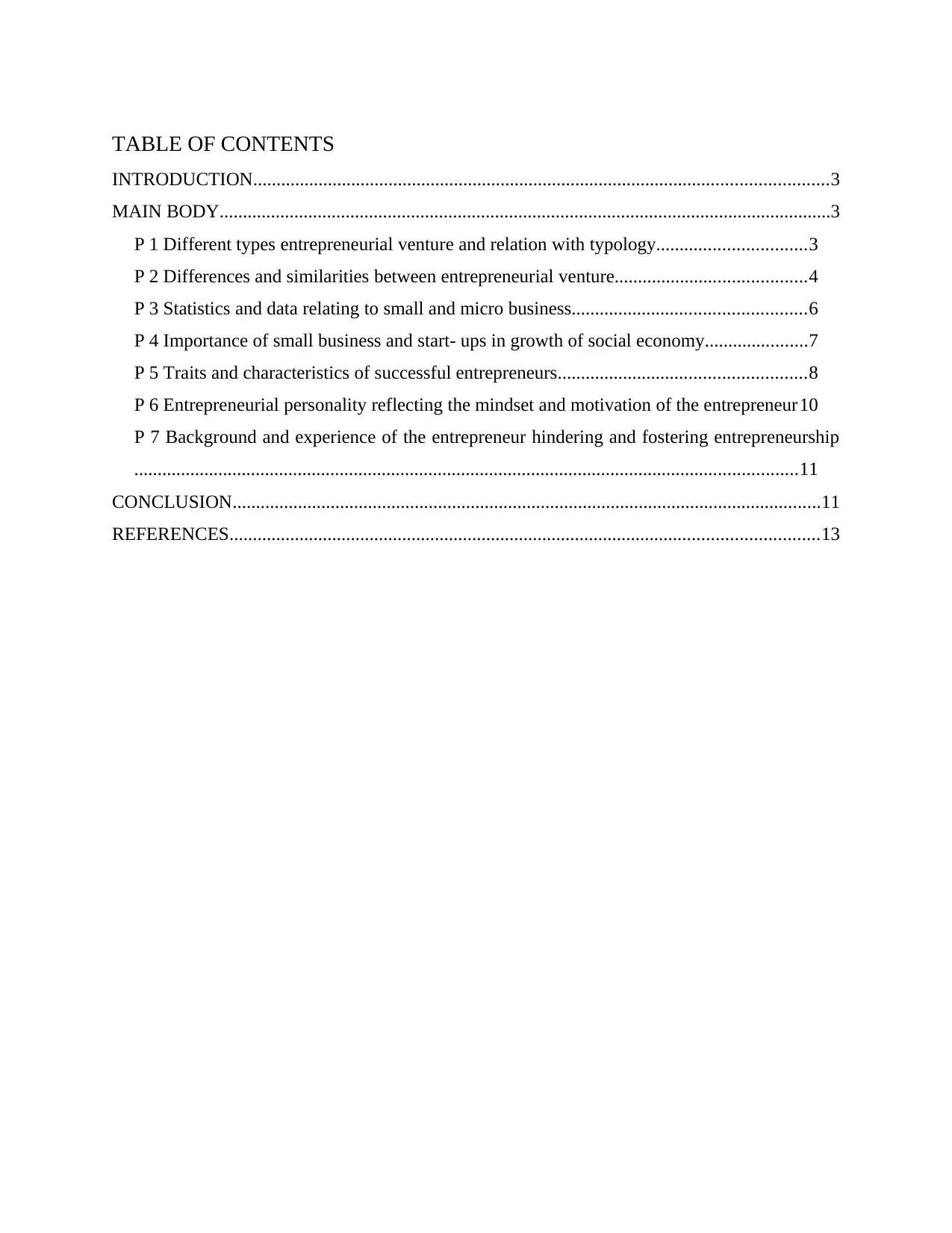
TABLE OF CONTENTS
INTRODUCTION...........................................................................................................................3
MAIN BODY...................................................................................................................................3
P 1 Different types entrepreneurial venture and relation with typology................................3
P 2 Differences and similarities between entrepreneurial venture.........................................4
P 3 Statistics and data relating to small and micro business..................................................6
P 4 Importance of small business and start- ups in growth of social economy......................7
P 5 Traits and characteristics of successful entrepreneurs.....................................................8
P 6 Entrepreneurial personality reflecting the mindset and motivation of the entrepreneur10
P 7 Background and experience of the entrepreneur hindering and fostering entrepreneurship
..............................................................................................................................................11
CONCLUSION..............................................................................................................................11
REFERENCES..............................................................................................................................13
INTRODUCTION...........................................................................................................................3
MAIN BODY...................................................................................................................................3
P 1 Different types entrepreneurial venture and relation with typology................................3
P 2 Differences and similarities between entrepreneurial venture.........................................4
P 3 Statistics and data relating to small and micro business..................................................6
P 4 Importance of small business and start- ups in growth of social economy......................7
P 5 Traits and characteristics of successful entrepreneurs.....................................................8
P 6 Entrepreneurial personality reflecting the mindset and motivation of the entrepreneur10
P 7 Background and experience of the entrepreneur hindering and fostering entrepreneurship
..............................................................................................................................................11
CONCLUSION..............................................................................................................................11
REFERENCES..............................................................................................................................13
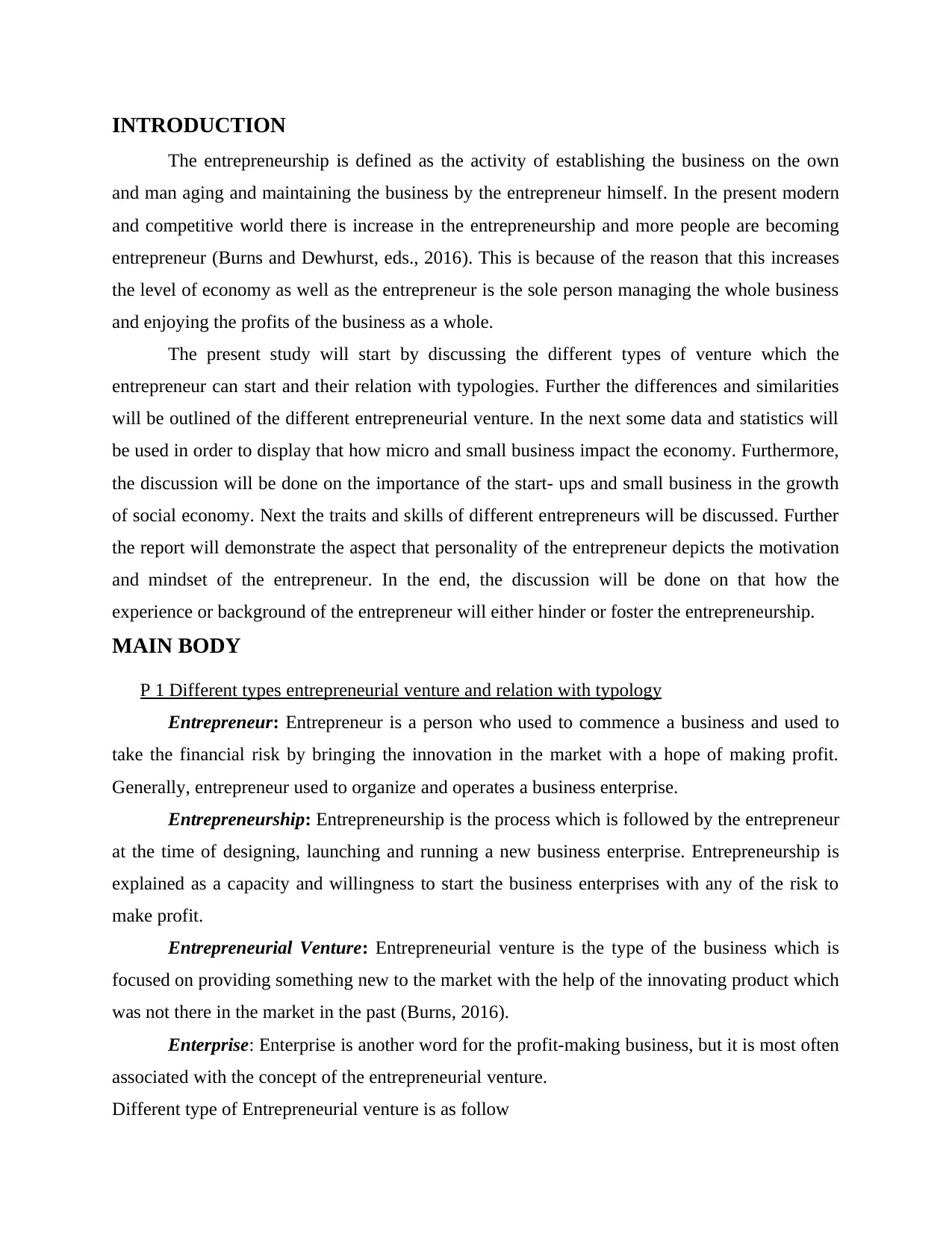
INTRODUCTION
The entrepreneurship is defined as the activity of establishing the business on the own
and man aging and maintaining the business by the entrepreneur himself. In the present modern
and competitive world there is increase in the entrepreneurship and more people are becoming
entrepreneur (Burns and Dewhurst, eds., 2016). This is because of the reason that this increases
the level of economy as well as the entrepreneur is the sole person managing the whole business
and enjoying the profits of the business as a whole.
The present study will start by discussing the different types of venture which the
entrepreneur can start and their relation with typologies. Further the differences and similarities
will be outlined of the different entrepreneurial venture. In the next some data and statistics will
be used in order to display that how micro and small business impact the economy. Furthermore,
the discussion will be done on the importance of the start- ups and small business in the growth
of social economy. Next the traits and skills of different entrepreneurs will be discussed. Further
the report will demonstrate the aspect that personality of the entrepreneur depicts the motivation
and mindset of the entrepreneur. In the end, the discussion will be done on that how the
experience or background of the entrepreneur will either hinder or foster the entrepreneurship.
MAIN BODY
P 1 Different types entrepreneurial venture and relation with typology
Entrepreneur: Entrepreneur is a person who used to commence a business and used to
take the financial risk by bringing the innovation in the market with a hope of making profit.
Generally, entrepreneur used to organize and operates a business enterprise.
Entrepreneurship: Entrepreneurship is the process which is followed by the entrepreneur
at the time of designing, launching and running a new business enterprise. Entrepreneurship is
explained as a capacity and willingness to start the business enterprises with any of the risk to
make profit.
Entrepreneurial Venture: Entrepreneurial venture is the type of the business which is
focused on providing something new to the market with the help of the innovating product which
was not there in the market in the past (Burns, 2016).
Enterprise: Enterprise is another word for the profit-making business, but it is most often
associated with the concept of the entrepreneurial venture.
Different type of Entrepreneurial venture is as follow
The entrepreneurship is defined as the activity of establishing the business on the own
and man aging and maintaining the business by the entrepreneur himself. In the present modern
and competitive world there is increase in the entrepreneurship and more people are becoming
entrepreneur (Burns and Dewhurst, eds., 2016). This is because of the reason that this increases
the level of economy as well as the entrepreneur is the sole person managing the whole business
and enjoying the profits of the business as a whole.
The present study will start by discussing the different types of venture which the
entrepreneur can start and their relation with typologies. Further the differences and similarities
will be outlined of the different entrepreneurial venture. In the next some data and statistics will
be used in order to display that how micro and small business impact the economy. Furthermore,
the discussion will be done on the importance of the start- ups and small business in the growth
of social economy. Next the traits and skills of different entrepreneurs will be discussed. Further
the report will demonstrate the aspect that personality of the entrepreneur depicts the motivation
and mindset of the entrepreneur. In the end, the discussion will be done on that how the
experience or background of the entrepreneur will either hinder or foster the entrepreneurship.
MAIN BODY
P 1 Different types entrepreneurial venture and relation with typology
Entrepreneur: Entrepreneur is a person who used to commence a business and used to
take the financial risk by bringing the innovation in the market with a hope of making profit.
Generally, entrepreneur used to organize and operates a business enterprise.
Entrepreneurship: Entrepreneurship is the process which is followed by the entrepreneur
at the time of designing, launching and running a new business enterprise. Entrepreneurship is
explained as a capacity and willingness to start the business enterprises with any of the risk to
make profit.
Entrepreneurial Venture: Entrepreneurial venture is the type of the business which is
focused on providing something new to the market with the help of the innovating product which
was not there in the market in the past (Burns, 2016).
Enterprise: Enterprise is another word for the profit-making business, but it is most often
associated with the concept of the entrepreneurial venture.
Different type of Entrepreneurial venture is as follow
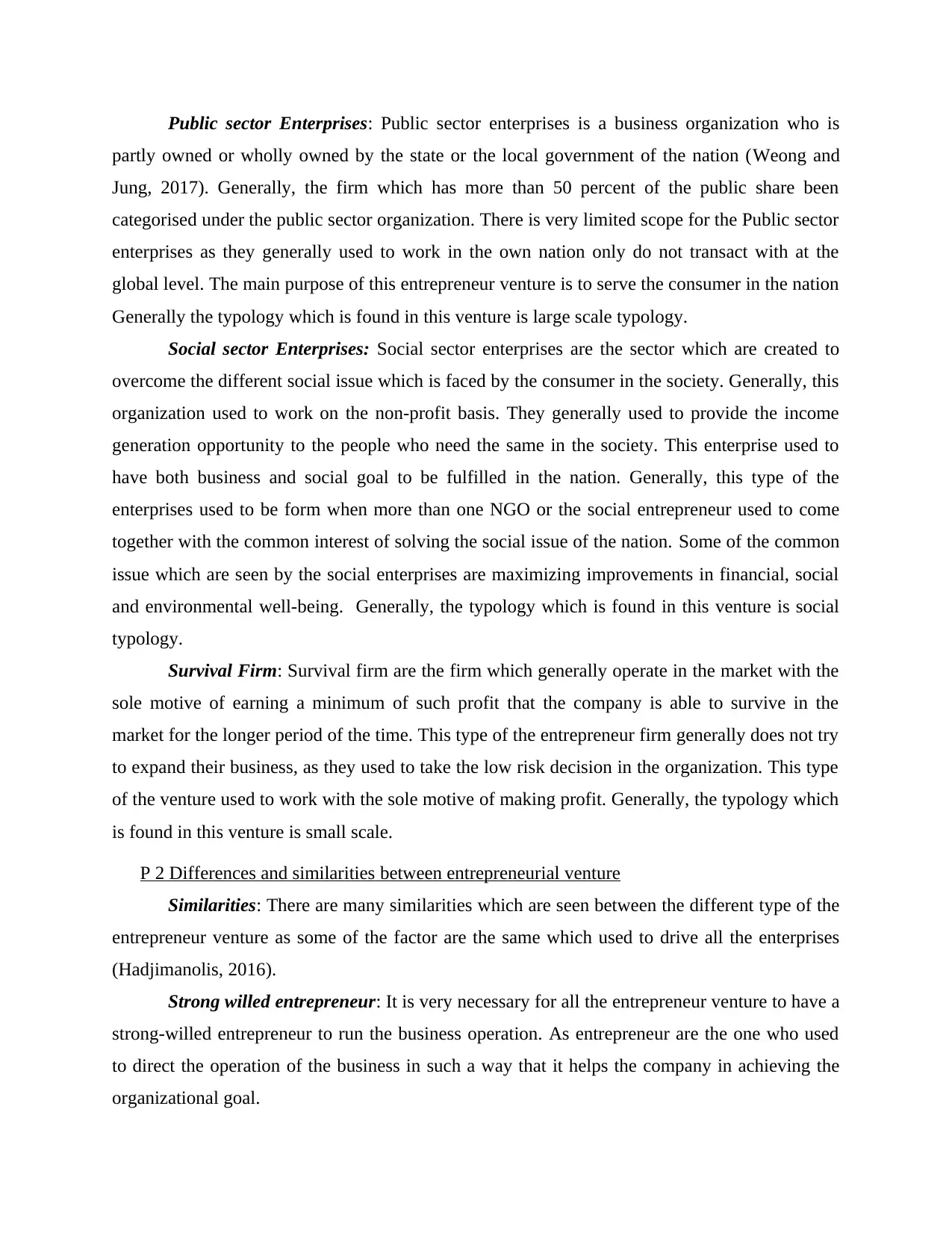
Public sector Enterprises: Public sector enterprises is a business organization who is
partly owned or wholly owned by the state or the local government of the nation (Weong and
Jung, 2017). Generally, the firm which has more than 50 percent of the public share been
categorised under the public sector organization. There is very limited scope for the Public sector
enterprises as they generally used to work in the own nation only do not transact with at the
global level. The main purpose of this entrepreneur venture is to serve the consumer in the nation
Generally the typology which is found in this venture is large scale typology.
Social sector Enterprises: Social sector enterprises are the sector which are created to
overcome the different social issue which is faced by the consumer in the society. Generally, this
organization used to work on the non-profit basis. They generally used to provide the income
generation opportunity to the people who need the same in the society. This enterprise used to
have both business and social goal to be fulfilled in the nation. Generally, this type of the
enterprises used to be form when more than one NGO or the social entrepreneur used to come
together with the common interest of solving the social issue of the nation. Some of the common
issue which are seen by the social enterprises are maximizing improvements in financial, social
and environmental well-being. Generally, the typology which is found in this venture is social
typology.
Survival Firm: Survival firm are the firm which generally operate in the market with the
sole motive of earning a minimum of such profit that the company is able to survive in the
market for the longer period of the time. This type of the entrepreneur firm generally does not try
to expand their business, as they used to take the low risk decision in the organization. This type
of the venture used to work with the sole motive of making profit. Generally, the typology which
is found in this venture is small scale.
P 2 Differences and similarities between entrepreneurial venture
Similarities: There are many similarities which are seen between the different type of the
entrepreneur venture as some of the factor are the same which used to drive all the enterprises
(Hadjimanolis, 2016).
Strong willed entrepreneur: It is very necessary for all the entrepreneur venture to have a
strong-willed entrepreneur to run the business operation. As entrepreneur are the one who used
to direct the operation of the business in such a way that it helps the company in achieving the
organizational goal.
partly owned or wholly owned by the state or the local government of the nation (Weong and
Jung, 2017). Generally, the firm which has more than 50 percent of the public share been
categorised under the public sector organization. There is very limited scope for the Public sector
enterprises as they generally used to work in the own nation only do not transact with at the
global level. The main purpose of this entrepreneur venture is to serve the consumer in the nation
Generally the typology which is found in this venture is large scale typology.
Social sector Enterprises: Social sector enterprises are the sector which are created to
overcome the different social issue which is faced by the consumer in the society. Generally, this
organization used to work on the non-profit basis. They generally used to provide the income
generation opportunity to the people who need the same in the society. This enterprise used to
have both business and social goal to be fulfilled in the nation. Generally, this type of the
enterprises used to be form when more than one NGO or the social entrepreneur used to come
together with the common interest of solving the social issue of the nation. Some of the common
issue which are seen by the social enterprises are maximizing improvements in financial, social
and environmental well-being. Generally, the typology which is found in this venture is social
typology.
Survival Firm: Survival firm are the firm which generally operate in the market with the
sole motive of earning a minimum of such profit that the company is able to survive in the
market for the longer period of the time. This type of the entrepreneur firm generally does not try
to expand their business, as they used to take the low risk decision in the organization. This type
of the venture used to work with the sole motive of making profit. Generally, the typology which
is found in this venture is small scale.
P 2 Differences and similarities between entrepreneurial venture
Similarities: There are many similarities which are seen between the different type of the
entrepreneur venture as some of the factor are the same which used to drive all the enterprises
(Hadjimanolis, 2016).
Strong willed entrepreneur: It is very necessary for all the entrepreneur venture to have a
strong-willed entrepreneur to run the business operation. As entrepreneur are the one who used
to direct the operation of the business in such a way that it helps the company in achieving the
organizational goal.
Secure Best Marks with AI Grader
Need help grading? Try our AI Grader for instant feedback on your assignments.
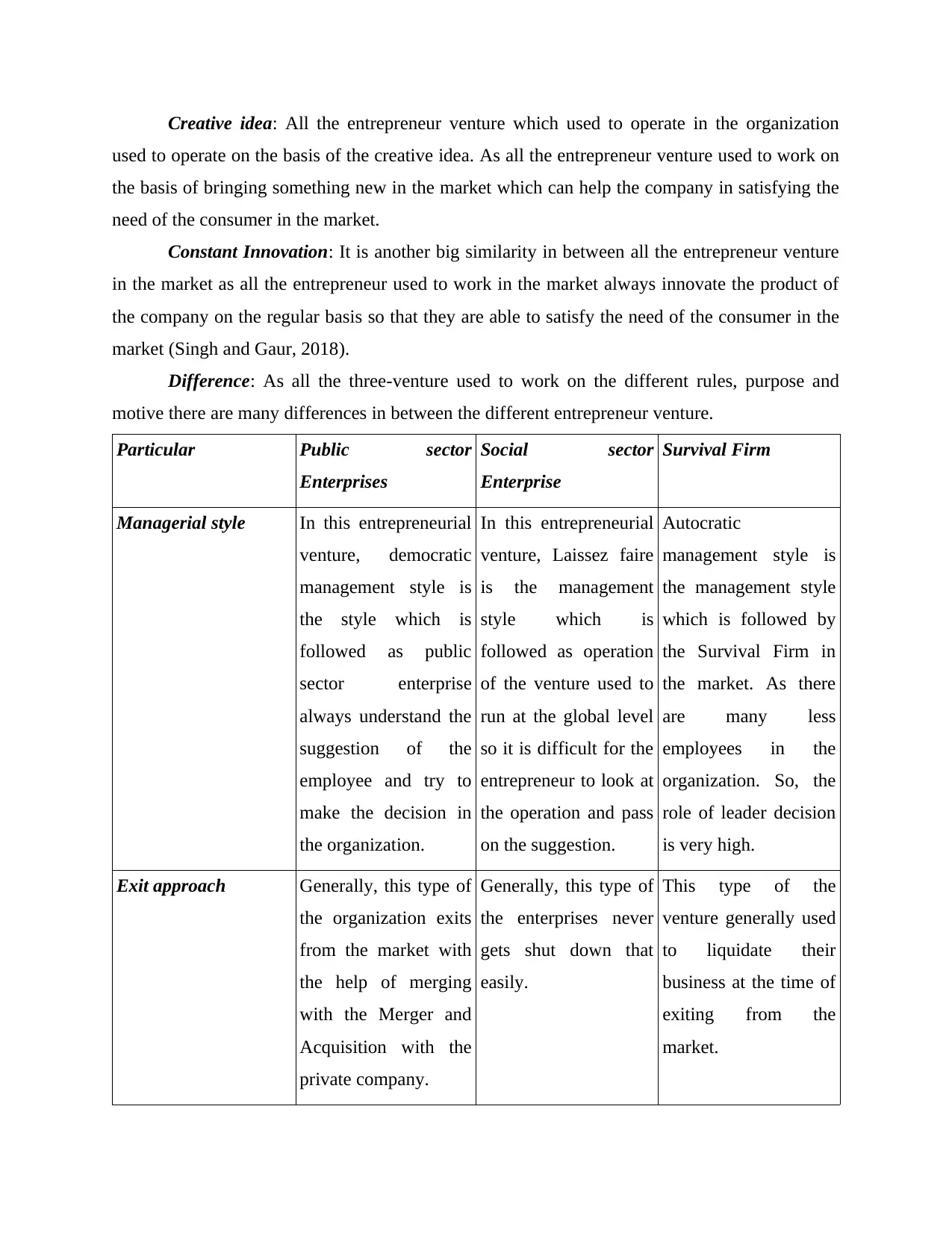
Creative idea: All the entrepreneur venture which used to operate in the organization
used to operate on the basis of the creative idea. As all the entrepreneur venture used to work on
the basis of bringing something new in the market which can help the company in satisfying the
need of the consumer in the market.
Constant Innovation: It is another big similarity in between all the entrepreneur venture
in the market as all the entrepreneur used to work in the market always innovate the product of
the company on the regular basis so that they are able to satisfy the need of the consumer in the
market (Singh and Gaur, 2018).
Difference: As all the three-venture used to work on the different rules, purpose and
motive there are many differences in between the different entrepreneur venture.
Particular Public sector
Enterprises
Social sector
Enterprise
Survival Firm
Managerial style In this entrepreneurial
venture, democratic
management style is
the style which is
followed as public
sector enterprise
always understand the
suggestion of the
employee and try to
make the decision in
the organization.
In this entrepreneurial
venture, Laissez faire
is the management
style which is
followed as operation
of the venture used to
run at the global level
so it is difficult for the
entrepreneur to look at
the operation and pass
on the suggestion.
Autocratic
management style is
the management style
which is followed by
the Survival Firm in
the market. As there
are many less
employees in the
organization. So, the
role of leader decision
is very high.
Exit approach Generally, this type of
the organization exits
from the market with
the help of merging
with the Merger and
Acquisition with the
private company.
Generally, this type of
the enterprises never
gets shut down that
easily.
This type of the
venture generally used
to liquidate their
business at the time of
exiting from the
market.
used to operate on the basis of the creative idea. As all the entrepreneur venture used to work on
the basis of bringing something new in the market which can help the company in satisfying the
need of the consumer in the market.
Constant Innovation: It is another big similarity in between all the entrepreneur venture
in the market as all the entrepreneur used to work in the market always innovate the product of
the company on the regular basis so that they are able to satisfy the need of the consumer in the
market (Singh and Gaur, 2018).
Difference: As all the three-venture used to work on the different rules, purpose and
motive there are many differences in between the different entrepreneur venture.
Particular Public sector
Enterprises
Social sector
Enterprise
Survival Firm
Managerial style In this entrepreneurial
venture, democratic
management style is
the style which is
followed as public
sector enterprise
always understand the
suggestion of the
employee and try to
make the decision in
the organization.
In this entrepreneurial
venture, Laissez faire
is the management
style which is
followed as operation
of the venture used to
run at the global level
so it is difficult for the
entrepreneur to look at
the operation and pass
on the suggestion.
Autocratic
management style is
the management style
which is followed by
the Survival Firm in
the market. As there
are many less
employees in the
organization. So, the
role of leader decision
is very high.
Exit approach Generally, this type of
the organization exits
from the market with
the help of merging
with the Merger and
Acquisition with the
private company.
Generally, this type of
the enterprises never
gets shut down that
easily.
This type of the
venture generally used
to liquidate their
business at the time of
exiting from the
market.
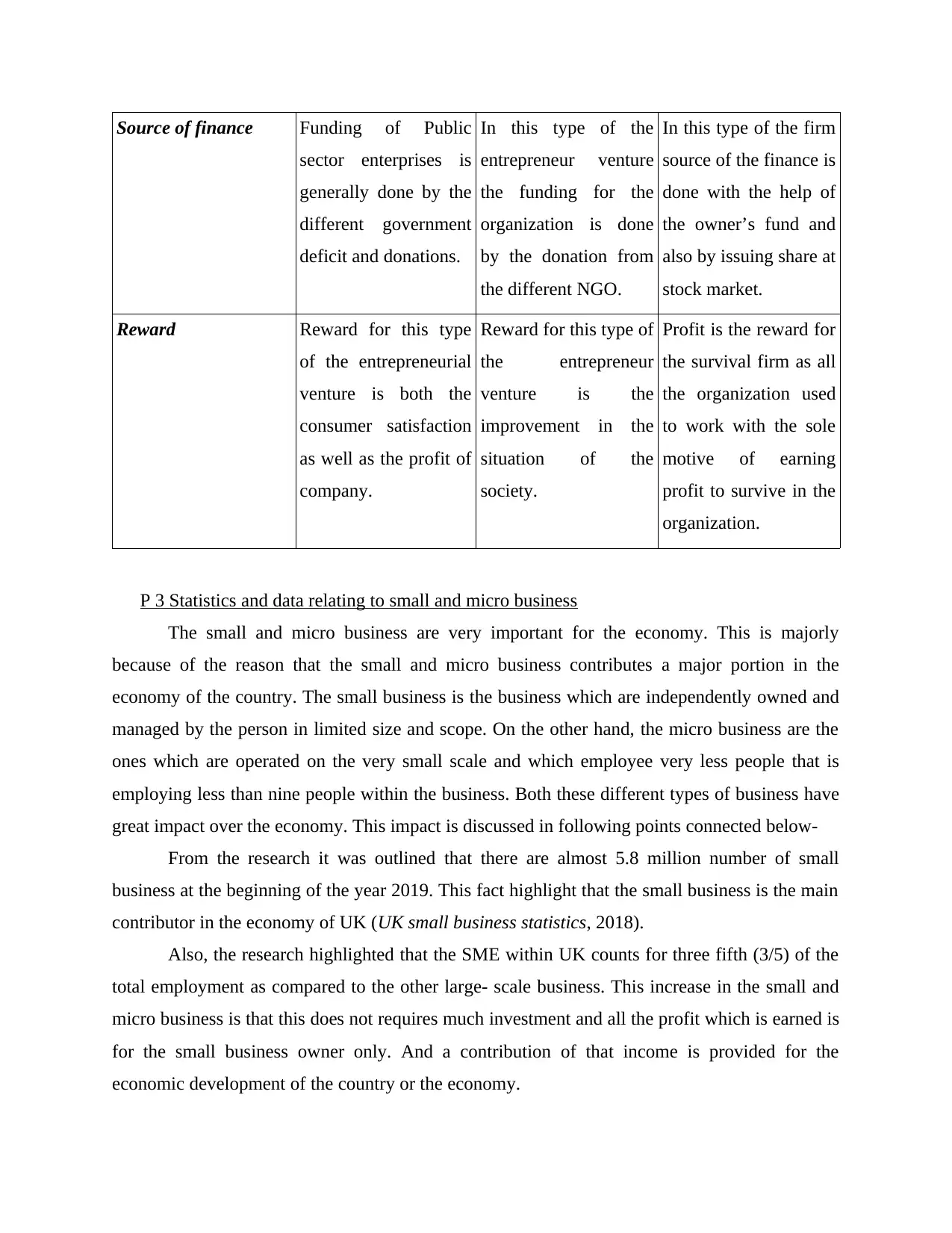
Source of finance Funding of Public
sector enterprises is
generally done by the
different government
deficit and donations.
In this type of the
entrepreneur venture
the funding for the
organization is done
by the donation from
the different NGO.
In this type of the firm
source of the finance is
done with the help of
the owner’s fund and
also by issuing share at
stock market.
Reward Reward for this type
of the entrepreneurial
venture is both the
consumer satisfaction
as well as the profit of
company.
Reward for this type of
the entrepreneur
venture is the
improvement in the
situation of the
society.
Profit is the reward for
the survival firm as all
the organization used
to work with the sole
motive of earning
profit to survive in the
organization.
P 3 Statistics and data relating to small and micro business
The small and micro business are very important for the economy. This is majorly
because of the reason that the small and micro business contributes a major portion in the
economy of the country. The small business is the business which are independently owned and
managed by the person in limited size and scope. On the other hand, the micro business are the
ones which are operated on the very small scale and which employee very less people that is
employing less than nine people within the business. Both these different types of business have
great impact over the economy. This impact is discussed in following points connected below-
From the research it was outlined that there are almost 5.8 million number of small
business at the beginning of the year 2019. This fact highlight that the small business is the main
contributor in the economy of UK (UK small business statistics, 2018).
Also, the research highlighted that the SME within UK counts for three fifth (3/5) of the
total employment as compared to the other large- scale business. This increase in the small and
micro business is that this does not requires much investment and all the profit which is earned is
for the small business owner only. And a contribution of that income is provided for the
economic development of the country or the economy.
sector enterprises is
generally done by the
different government
deficit and donations.
In this type of the
entrepreneur venture
the funding for the
organization is done
by the donation from
the different NGO.
In this type of the firm
source of the finance is
done with the help of
the owner’s fund and
also by issuing share at
stock market.
Reward Reward for this type
of the entrepreneurial
venture is both the
consumer satisfaction
as well as the profit of
company.
Reward for this type of
the entrepreneur
venture is the
improvement in the
situation of the
society.
Profit is the reward for
the survival firm as all
the organization used
to work with the sole
motive of earning
profit to survive in the
organization.
P 3 Statistics and data relating to small and micro business
The small and micro business are very important for the economy. This is majorly
because of the reason that the small and micro business contributes a major portion in the
economy of the country. The small business is the business which are independently owned and
managed by the person in limited size and scope. On the other hand, the micro business are the
ones which are operated on the very small scale and which employee very less people that is
employing less than nine people within the business. Both these different types of business have
great impact over the economy. This impact is discussed in following points connected below-
From the research it was outlined that there are almost 5.8 million number of small
business at the beginning of the year 2019. This fact highlight that the small business is the main
contributor in the economy of UK (UK small business statistics, 2018).
Also, the research highlighted that the SME within UK counts for three fifth (3/5) of the
total employment as compared to the other large- scale business. This increase in the small and
micro business is that this does not requires much investment and all the profit which is earned is
for the small business owner only. And a contribution of that income is provided for the
economic development of the country or the economy.
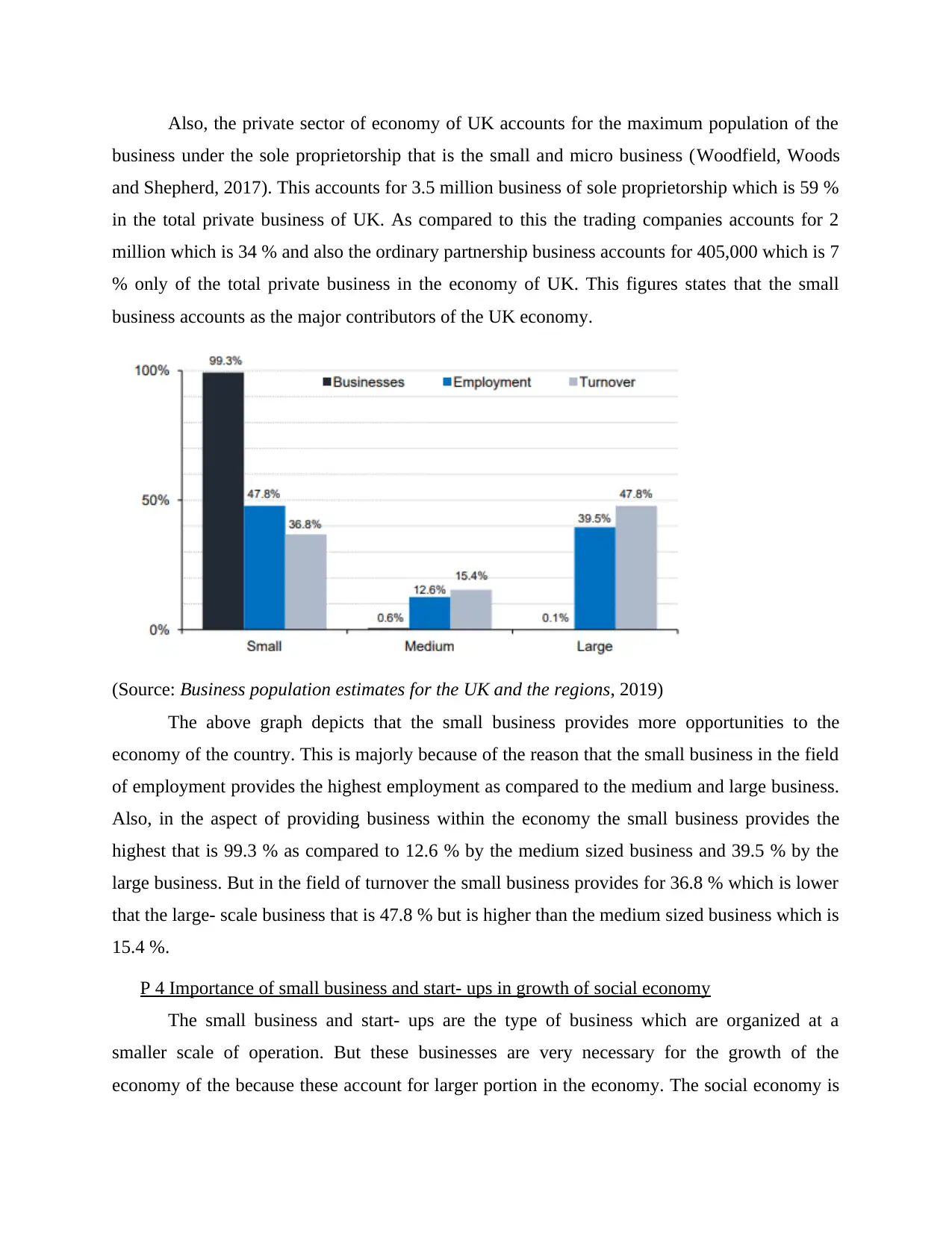
Also, the private sector of economy of UK accounts for the maximum population of the
business under the sole proprietorship that is the small and micro business (Woodfield, Woods
and Shepherd, 2017). This accounts for 3.5 million business of sole proprietorship which is 59 %
in the total private business of UK. As compared to this the trading companies accounts for 2
million which is 34 % and also the ordinary partnership business accounts for 405,000 which is 7
% only of the total private business in the economy of UK. This figures states that the small
business accounts as the major contributors of the UK economy.
(Source: Business population estimates for the UK and the regions, 2019)
The above graph depicts that the small business provides more opportunities to the
economy of the country. This is majorly because of the reason that the small business in the field
of employment provides the highest employment as compared to the medium and large business.
Also, in the aspect of providing business within the economy the small business provides the
highest that is 99.3 % as compared to 12.6 % by the medium sized business and 39.5 % by the
large business. But in the field of turnover the small business provides for 36.8 % which is lower
that the large- scale business that is 47.8 % but is higher than the medium sized business which is
15.4 %.
P 4 Importance of small business and start- ups in growth of social economy
The small business and start- ups are the type of business which are organized at a
smaller scale of operation. But these businesses are very necessary for the growth of the
economy of the because these account for larger portion in the economy. The social economy is
business under the sole proprietorship that is the small and micro business (Woodfield, Woods
and Shepherd, 2017). This accounts for 3.5 million business of sole proprietorship which is 59 %
in the total private business of UK. As compared to this the trading companies accounts for 2
million which is 34 % and also the ordinary partnership business accounts for 405,000 which is 7
% only of the total private business in the economy of UK. This figures states that the small
business accounts as the major contributors of the UK economy.
(Source: Business population estimates for the UK and the regions, 2019)
The above graph depicts that the small business provides more opportunities to the
economy of the country. This is majorly because of the reason that the small business in the field
of employment provides the highest employment as compared to the medium and large business.
Also, in the aspect of providing business within the economy the small business provides the
highest that is 99.3 % as compared to 12.6 % by the medium sized business and 39.5 % by the
large business. But in the field of turnover the small business provides for 36.8 % which is lower
that the large- scale business that is 47.8 % but is higher than the medium sized business which is
15.4 %.
P 4 Importance of small business and start- ups in growth of social economy
The small business and start- ups are the type of business which are organized at a
smaller scale of operation. But these businesses are very necessary for the growth of the
economy of the because these account for larger portion in the economy. The social economy is
Paraphrase This Document
Need a fresh take? Get an instant paraphrase of this document with our AI Paraphraser
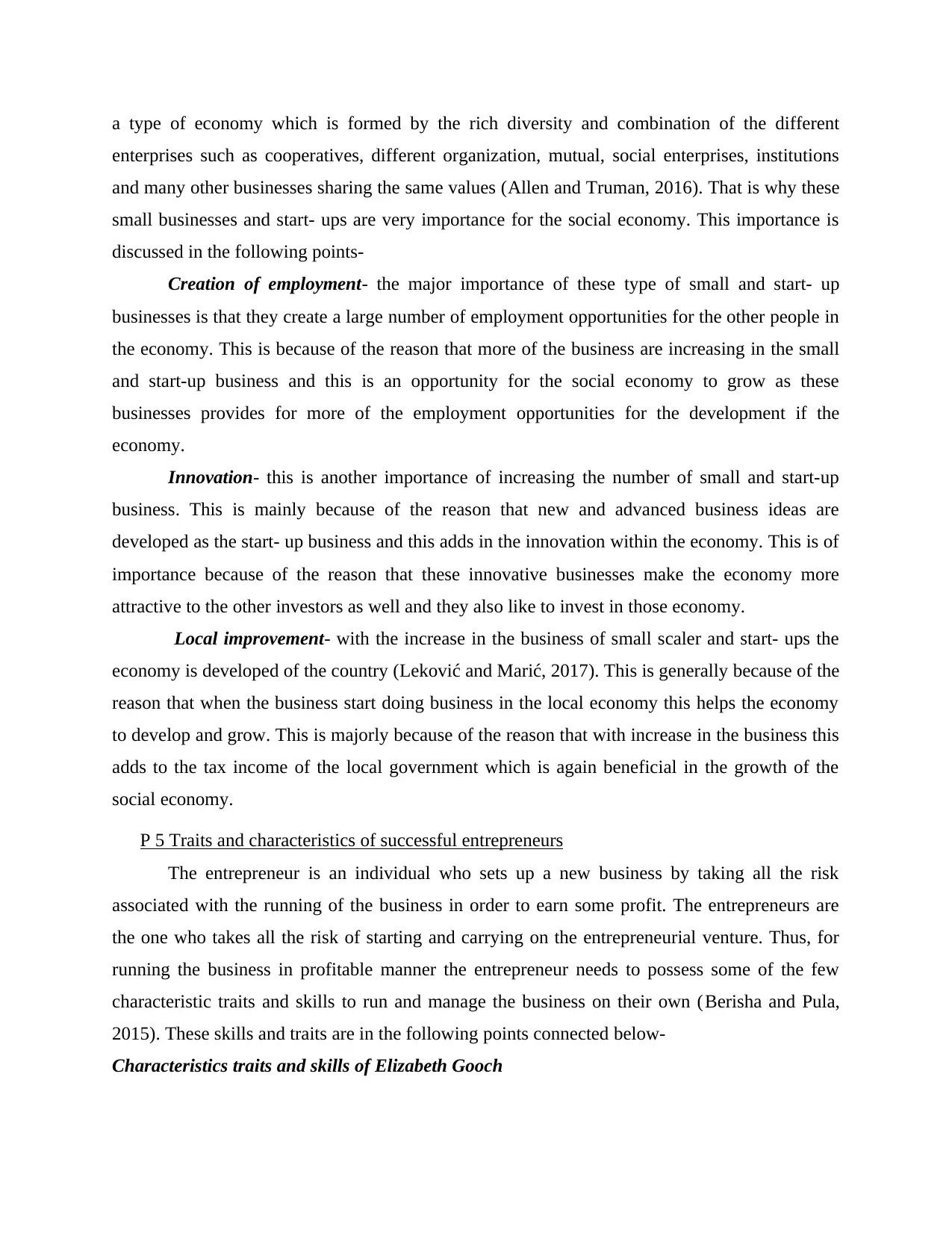
a type of economy which is formed by the rich diversity and combination of the different
enterprises such as cooperatives, different organization, mutual, social enterprises, institutions
and many other businesses sharing the same values (Allen and Truman, 2016). That is why these
small businesses and start- ups are very importance for the social economy. This importance is
discussed in the following points-
Creation of employment- the major importance of these type of small and start- up
businesses is that they create a large number of employment opportunities for the other people in
the economy. This is because of the reason that more of the business are increasing in the small
and start-up business and this is an opportunity for the social economy to grow as these
businesses provides for more of the employment opportunities for the development if the
economy.
Innovation- this is another importance of increasing the number of small and start-up
business. This is mainly because of the reason that new and advanced business ideas are
developed as the start- up business and this adds in the innovation within the economy. This is of
importance because of the reason that these innovative businesses make the economy more
attractive to the other investors as well and they also like to invest in those economy.
Local improvement- with the increase in the business of small scaler and start- ups the
economy is developed of the country (Leković and Marić, 2017). This is generally because of the
reason that when the business start doing business in the local economy this helps the economy
to develop and grow. This is majorly because of the reason that with increase in the business this
adds to the tax income of the local government which is again beneficial in the growth of the
social economy.
P 5 Traits and characteristics of successful entrepreneurs
The entrepreneur is an individual who sets up a new business by taking all the risk
associated with the running of the business in order to earn some profit. The entrepreneurs are
the one who takes all the risk of starting and carrying on the entrepreneurial venture. Thus, for
running the business in profitable manner the entrepreneur needs to possess some of the few
characteristic traits and skills to run and manage the business on their own (Berisha and Pula,
2015). These skills and traits are in the following points connected below-
Characteristics traits and skills of Elizabeth Gooch
enterprises such as cooperatives, different organization, mutual, social enterprises, institutions
and many other businesses sharing the same values (Allen and Truman, 2016). That is why these
small businesses and start- ups are very importance for the social economy. This importance is
discussed in the following points-
Creation of employment- the major importance of these type of small and start- up
businesses is that they create a large number of employment opportunities for the other people in
the economy. This is because of the reason that more of the business are increasing in the small
and start-up business and this is an opportunity for the social economy to grow as these
businesses provides for more of the employment opportunities for the development if the
economy.
Innovation- this is another importance of increasing the number of small and start-up
business. This is mainly because of the reason that new and advanced business ideas are
developed as the start- up business and this adds in the innovation within the economy. This is of
importance because of the reason that these innovative businesses make the economy more
attractive to the other investors as well and they also like to invest in those economy.
Local improvement- with the increase in the business of small scaler and start- ups the
economy is developed of the country (Leković and Marić, 2017). This is generally because of the
reason that when the business start doing business in the local economy this helps the economy
to develop and grow. This is majorly because of the reason that with increase in the business this
adds to the tax income of the local government which is again beneficial in the growth of the
social economy.
P 5 Traits and characteristics of successful entrepreneurs
The entrepreneur is an individual who sets up a new business by taking all the risk
associated with the running of the business in order to earn some profit. The entrepreneurs are
the one who takes all the risk of starting and carrying on the entrepreneurial venture. Thus, for
running the business in profitable manner the entrepreneur needs to possess some of the few
characteristic traits and skills to run and manage the business on their own (Berisha and Pula,
2015). These skills and traits are in the following points connected below-
Characteristics traits and skills of Elizabeth Gooch
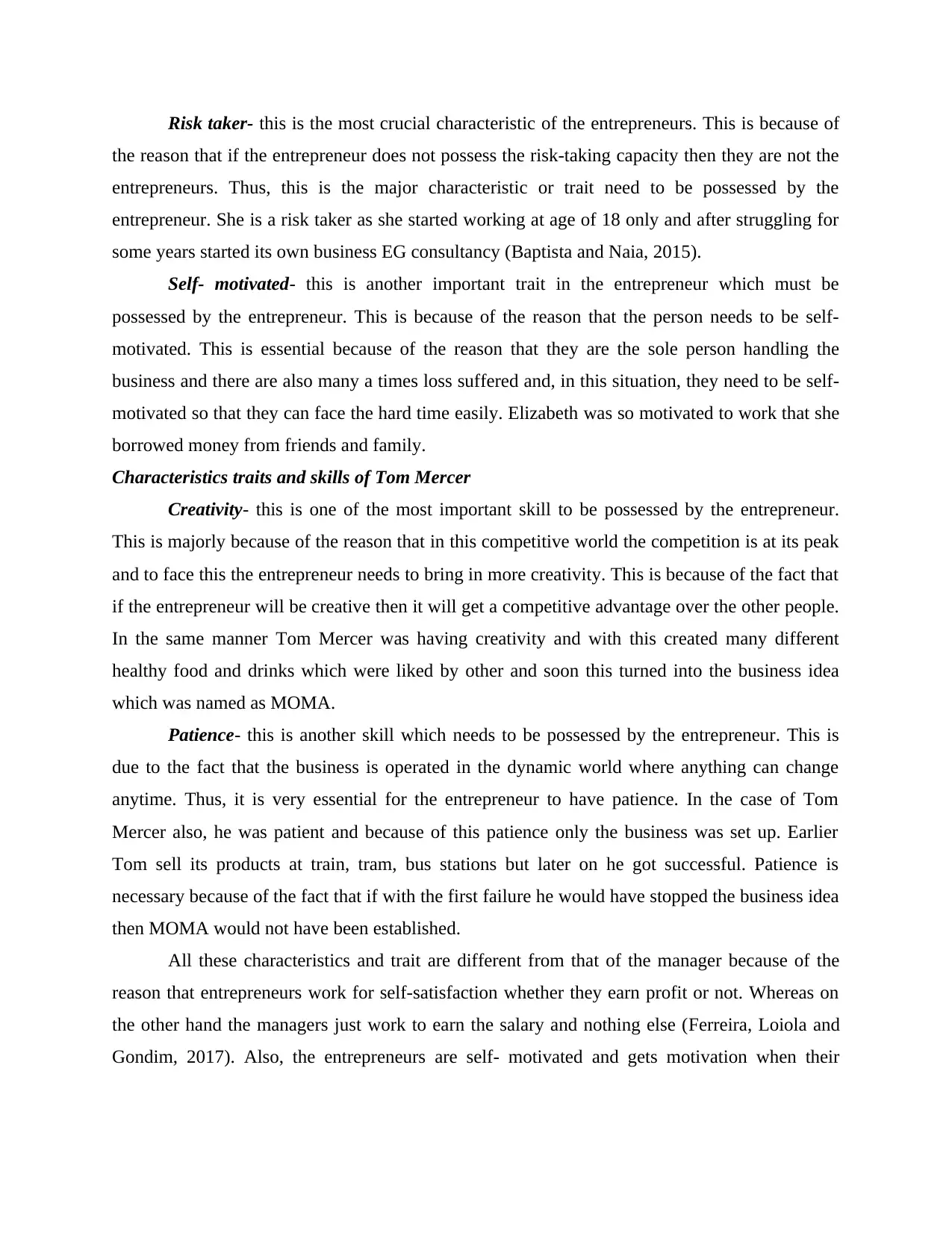
Risk taker- this is the most crucial characteristic of the entrepreneurs. This is because of
the reason that if the entrepreneur does not possess the risk-taking capacity then they are not the
entrepreneurs. Thus, this is the major characteristic or trait need to be possessed by the
entrepreneur. She is a risk taker as she started working at age of 18 only and after struggling for
some years started its own business EG consultancy (Baptista and Naia, 2015).
Self- motivated- this is another important trait in the entrepreneur which must be
possessed by the entrepreneur. This is because of the reason that the person needs to be self-
motivated. This is essential because of the reason that they are the sole person handling the
business and there are also many a times loss suffered and, in this situation, they need to be self-
motivated so that they can face the hard time easily. Elizabeth was so motivated to work that she
borrowed money from friends and family.
Characteristics traits and skills of Tom Mercer
Creativity- this is one of the most important skill to be possessed by the entrepreneur.
This is majorly because of the reason that in this competitive world the competition is at its peak
and to face this the entrepreneur needs to bring in more creativity. This is because of the fact that
if the entrepreneur will be creative then it will get a competitive advantage over the other people.
In the same manner Tom Mercer was having creativity and with this created many different
healthy food and drinks which were liked by other and soon this turned into the business idea
which was named as MOMA.
Patience- this is another skill which needs to be possessed by the entrepreneur. This is
due to the fact that the business is operated in the dynamic world where anything can change
anytime. Thus, it is very essential for the entrepreneur to have patience. In the case of Tom
Mercer also, he was patient and because of this patience only the business was set up. Earlier
Tom sell its products at train, tram, bus stations but later on he got successful. Patience is
necessary because of the fact that if with the first failure he would have stopped the business idea
then MOMA would not have been established.
All these characteristics and trait are different from that of the manager because of the
reason that entrepreneurs work for self-satisfaction whether they earn profit or not. Whereas on
the other hand the managers just work to earn the salary and nothing else (Ferreira, Loiola and
Gondim, 2017). Also, the entrepreneurs are self- motivated and gets motivation when their
the reason that if the entrepreneur does not possess the risk-taking capacity then they are not the
entrepreneurs. Thus, this is the major characteristic or trait need to be possessed by the
entrepreneur. She is a risk taker as she started working at age of 18 only and after struggling for
some years started its own business EG consultancy (Baptista and Naia, 2015).
Self- motivated- this is another important trait in the entrepreneur which must be
possessed by the entrepreneur. This is because of the reason that the person needs to be self-
motivated. This is essential because of the reason that they are the sole person handling the
business and there are also many a times loss suffered and, in this situation, they need to be self-
motivated so that they can face the hard time easily. Elizabeth was so motivated to work that she
borrowed money from friends and family.
Characteristics traits and skills of Tom Mercer
Creativity- this is one of the most important skill to be possessed by the entrepreneur.
This is majorly because of the reason that in this competitive world the competition is at its peak
and to face this the entrepreneur needs to bring in more creativity. This is because of the fact that
if the entrepreneur will be creative then it will get a competitive advantage over the other people.
In the same manner Tom Mercer was having creativity and with this created many different
healthy food and drinks which were liked by other and soon this turned into the business idea
which was named as MOMA.
Patience- this is another skill which needs to be possessed by the entrepreneur. This is
due to the fact that the business is operated in the dynamic world where anything can change
anytime. Thus, it is very essential for the entrepreneur to have patience. In the case of Tom
Mercer also, he was patient and because of this patience only the business was set up. Earlier
Tom sell its products at train, tram, bus stations but later on he got successful. Patience is
necessary because of the fact that if with the first failure he would have stopped the business idea
then MOMA would not have been established.
All these characteristics and trait are different from that of the manager because of the
reason that entrepreneurs work for self-satisfaction whether they earn profit or not. Whereas on
the other hand the managers just work to earn the salary and nothing else (Ferreira, Loiola and
Gondim, 2017). Also, the entrepreneurs are self- motivated and gets motivation when their
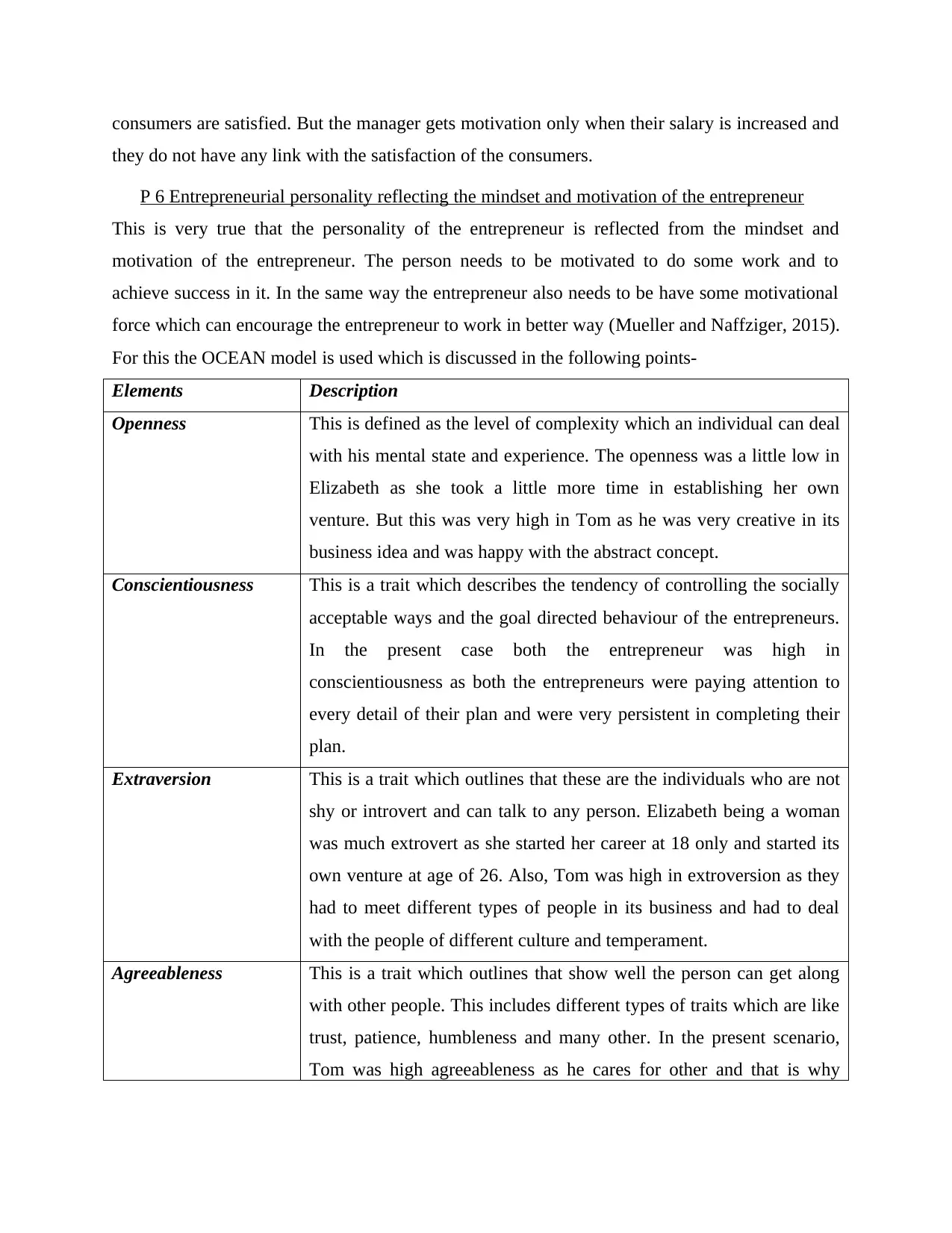
consumers are satisfied. But the manager gets motivation only when their salary is increased and
they do not have any link with the satisfaction of the consumers.
P 6 Entrepreneurial personality reflecting the mindset and motivation of the entrepreneur
This is very true that the personality of the entrepreneur is reflected from the mindset and
motivation of the entrepreneur. The person needs to be motivated to do some work and to
achieve success in it. In the same way the entrepreneur also needs to be have some motivational
force which can encourage the entrepreneur to work in better way (Mueller and Naffziger, 2015).
For this the OCEAN model is used which is discussed in the following points-
Elements Description
Openness This is defined as the level of complexity which an individual can deal
with his mental state and experience. The openness was a little low in
Elizabeth as she took a little more time in establishing her own
venture. But this was very high in Tom as he was very creative in its
business idea and was happy with the abstract concept.
Conscientiousness This is a trait which describes the tendency of controlling the socially
acceptable ways and the goal directed behaviour of the entrepreneurs.
In the present case both the entrepreneur was high in
conscientiousness as both the entrepreneurs were paying attention to
every detail of their plan and were very persistent in completing their
plan.
Extraversion This is a trait which outlines that these are the individuals who are not
shy or introvert and can talk to any person. Elizabeth being a woman
was much extrovert as she started her career at 18 only and started its
own venture at age of 26. Also, Tom was high in extroversion as they
had to meet different types of people in its business and had to deal
with the people of different culture and temperament.
Agreeableness This is a trait which outlines that show well the person can get along
with other people. This includes different types of traits which are like
trust, patience, humbleness and many other. In the present scenario,
Tom was high agreeableness as he cares for other and that is why
they do not have any link with the satisfaction of the consumers.
P 6 Entrepreneurial personality reflecting the mindset and motivation of the entrepreneur
This is very true that the personality of the entrepreneur is reflected from the mindset and
motivation of the entrepreneur. The person needs to be motivated to do some work and to
achieve success in it. In the same way the entrepreneur also needs to be have some motivational
force which can encourage the entrepreneur to work in better way (Mueller and Naffziger, 2015).
For this the OCEAN model is used which is discussed in the following points-
Elements Description
Openness This is defined as the level of complexity which an individual can deal
with his mental state and experience. The openness was a little low in
Elizabeth as she took a little more time in establishing her own
venture. But this was very high in Tom as he was very creative in its
business idea and was happy with the abstract concept.
Conscientiousness This is a trait which describes the tendency of controlling the socially
acceptable ways and the goal directed behaviour of the entrepreneurs.
In the present case both the entrepreneur was high in
conscientiousness as both the entrepreneurs were paying attention to
every detail of their plan and were very persistent in completing their
plan.
Extraversion This is a trait which outlines that these are the individuals who are not
shy or introvert and can talk to any person. Elizabeth being a woman
was much extrovert as she started her career at 18 only and started its
own venture at age of 26. Also, Tom was high in extroversion as they
had to meet different types of people in its business and had to deal
with the people of different culture and temperament.
Agreeableness This is a trait which outlines that show well the person can get along
with other people. This includes different types of traits which are like
trust, patience, humbleness and many other. In the present scenario,
Tom was high agreeableness as he cares for other and that is why
Secure Best Marks with AI Grader
Need help grading? Try our AI Grader for instant feedback on your assignments.
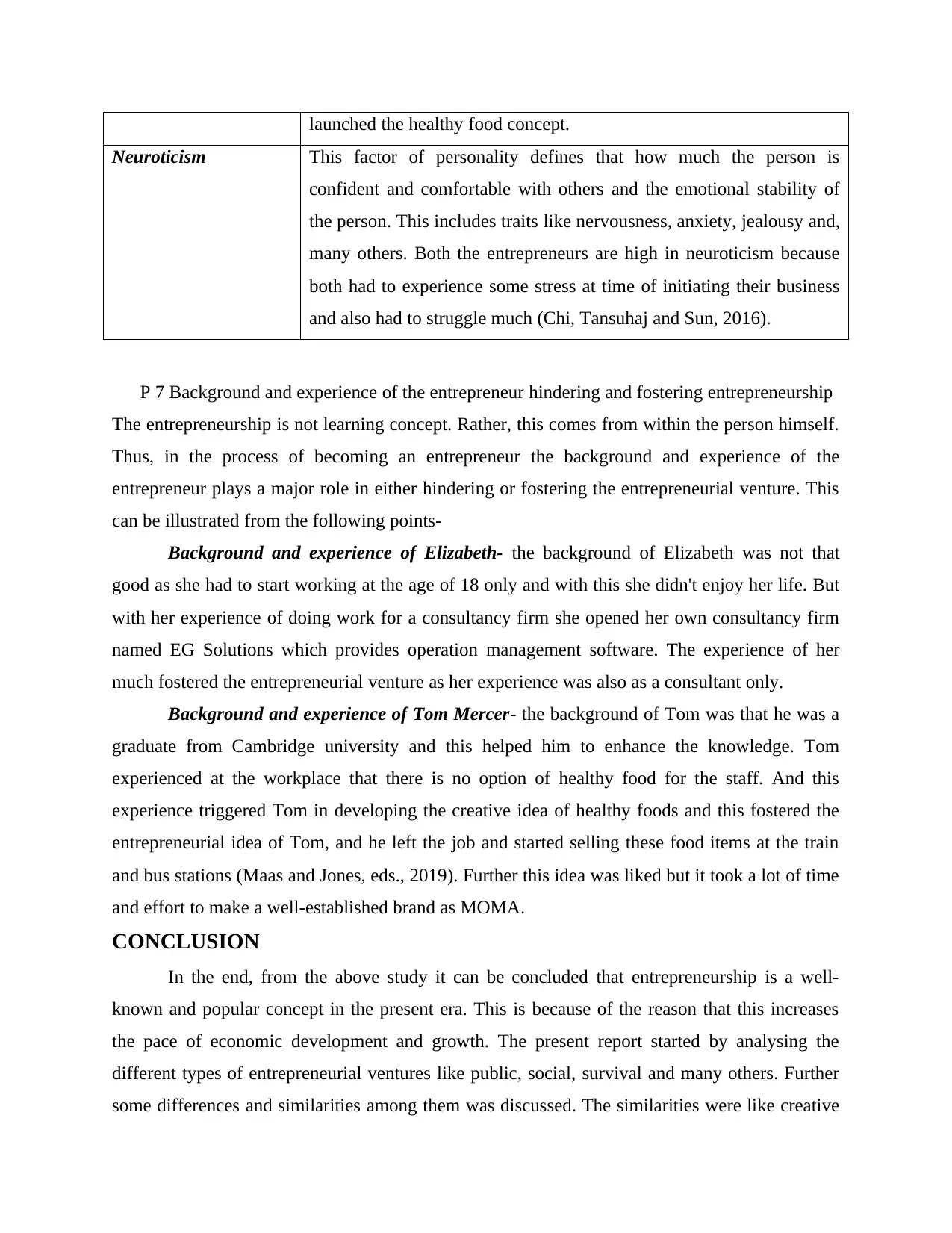
launched the healthy food concept.
Neuroticism This factor of personality defines that how much the person is
confident and comfortable with others and the emotional stability of
the person. This includes traits like nervousness, anxiety, jealousy and,
many others. Both the entrepreneurs are high in neuroticism because
both had to experience some stress at time of initiating their business
and also had to struggle much (Chi, Tansuhaj and Sun, 2016).
P 7 Background and experience of the entrepreneur hindering and fostering entrepreneurship
The entrepreneurship is not learning concept. Rather, this comes from within the person himself.
Thus, in the process of becoming an entrepreneur the background and experience of the
entrepreneur plays a major role in either hindering or fostering the entrepreneurial venture. This
can be illustrated from the following points-
Background and experience of Elizabeth- the background of Elizabeth was not that
good as she had to start working at the age of 18 only and with this she didn't enjoy her life. But
with her experience of doing work for a consultancy firm she opened her own consultancy firm
named EG Solutions which provides operation management software. The experience of her
much fostered the entrepreneurial venture as her experience was also as a consultant only.
Background and experience of Tom Mercer- the background of Tom was that he was a
graduate from Cambridge university and this helped him to enhance the knowledge. Tom
experienced at the workplace that there is no option of healthy food for the staff. And this
experience triggered Tom in developing the creative idea of healthy foods and this fostered the
entrepreneurial idea of Tom, and he left the job and started selling these food items at the train
and bus stations (Maas and Jones, eds., 2019). Further this idea was liked but it took a lot of time
and effort to make a well-established brand as MOMA.
CONCLUSION
In the end, from the above study it can be concluded that entrepreneurship is a well-
known and popular concept in the present era. This is because of the reason that this increases
the pace of economic development and growth. The present report started by analysing the
different types of entrepreneurial ventures like public, social, survival and many others. Further
some differences and similarities among them was discussed. The similarities were like creative
Neuroticism This factor of personality defines that how much the person is
confident and comfortable with others and the emotional stability of
the person. This includes traits like nervousness, anxiety, jealousy and,
many others. Both the entrepreneurs are high in neuroticism because
both had to experience some stress at time of initiating their business
and also had to struggle much (Chi, Tansuhaj and Sun, 2016).
P 7 Background and experience of the entrepreneur hindering and fostering entrepreneurship
The entrepreneurship is not learning concept. Rather, this comes from within the person himself.
Thus, in the process of becoming an entrepreneur the background and experience of the
entrepreneur plays a major role in either hindering or fostering the entrepreneurial venture. This
can be illustrated from the following points-
Background and experience of Elizabeth- the background of Elizabeth was not that
good as she had to start working at the age of 18 only and with this she didn't enjoy her life. But
with her experience of doing work for a consultancy firm she opened her own consultancy firm
named EG Solutions which provides operation management software. The experience of her
much fostered the entrepreneurial venture as her experience was also as a consultant only.
Background and experience of Tom Mercer- the background of Tom was that he was a
graduate from Cambridge university and this helped him to enhance the knowledge. Tom
experienced at the workplace that there is no option of healthy food for the staff. And this
experience triggered Tom in developing the creative idea of healthy foods and this fostered the
entrepreneurial idea of Tom, and he left the job and started selling these food items at the train
and bus stations (Maas and Jones, eds., 2019). Further this idea was liked but it took a lot of time
and effort to make a well-established brand as MOMA.
CONCLUSION
In the end, from the above study it can be concluded that entrepreneurship is a well-
known and popular concept in the present era. This is because of the reason that this increases
the pace of economic development and growth. The present report started by analysing the
different types of entrepreneurial ventures like public, social, survival and many others. Further
some differences and similarities among them was discussed. The similarities were like creative
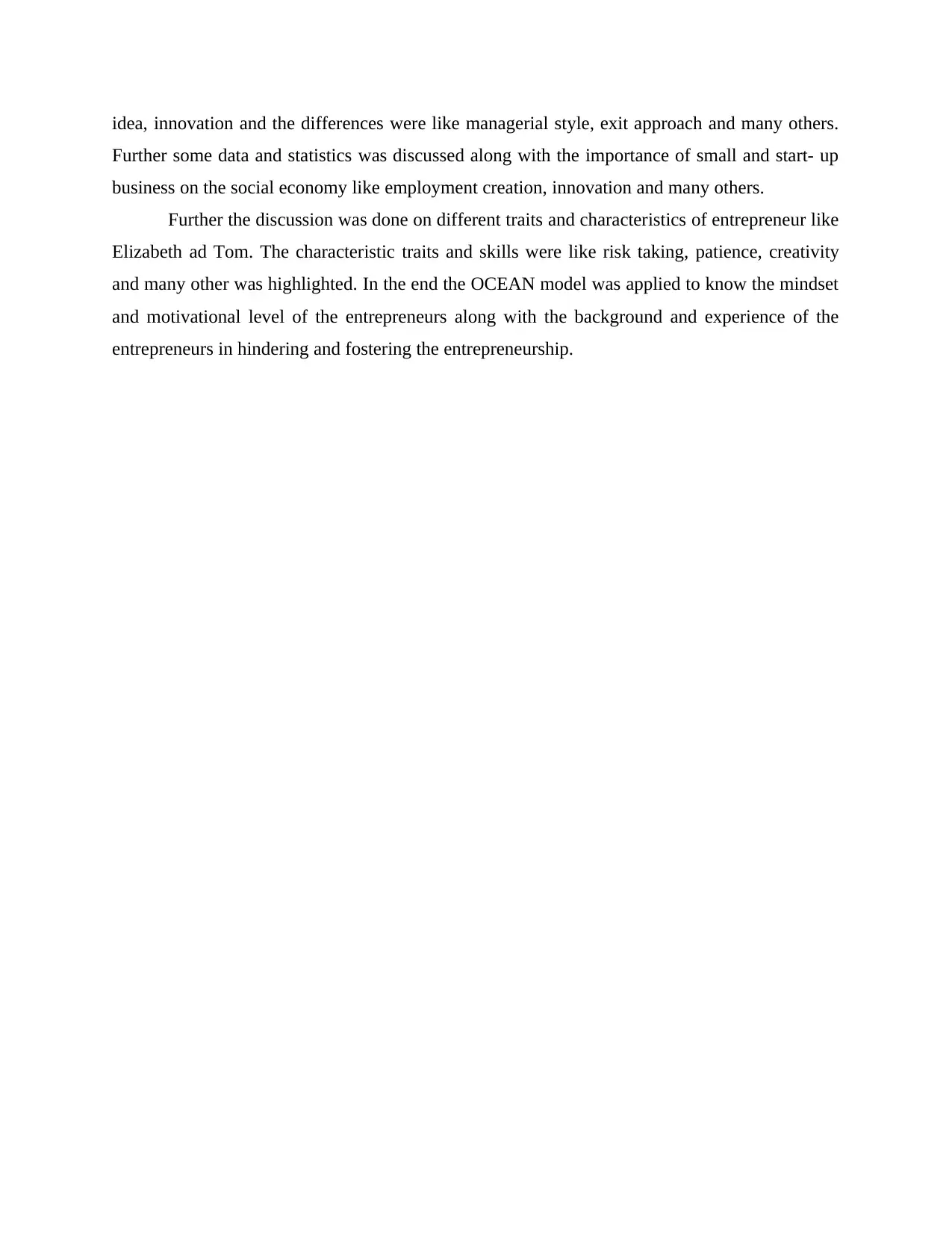
idea, innovation and the differences were like managerial style, exit approach and many others.
Further some data and statistics was discussed along with the importance of small and start- up
business on the social economy like employment creation, innovation and many others.
Further the discussion was done on different traits and characteristics of entrepreneur like
Elizabeth ad Tom. The characteristic traits and skills were like risk taking, patience, creativity
and many other was highlighted. In the end the OCEAN model was applied to know the mindset
and motivational level of the entrepreneurs along with the background and experience of the
entrepreneurs in hindering and fostering the entrepreneurship.
Further some data and statistics was discussed along with the importance of small and start- up
business on the social economy like employment creation, innovation and many others.
Further the discussion was done on different traits and characteristics of entrepreneur like
Elizabeth ad Tom. The characteristic traits and skills were like risk taking, patience, creativity
and many other was highlighted. In the end the OCEAN model was applied to know the mindset
and motivational level of the entrepreneurs along with the background and experience of the
entrepreneurs in hindering and fostering the entrepreneurship.
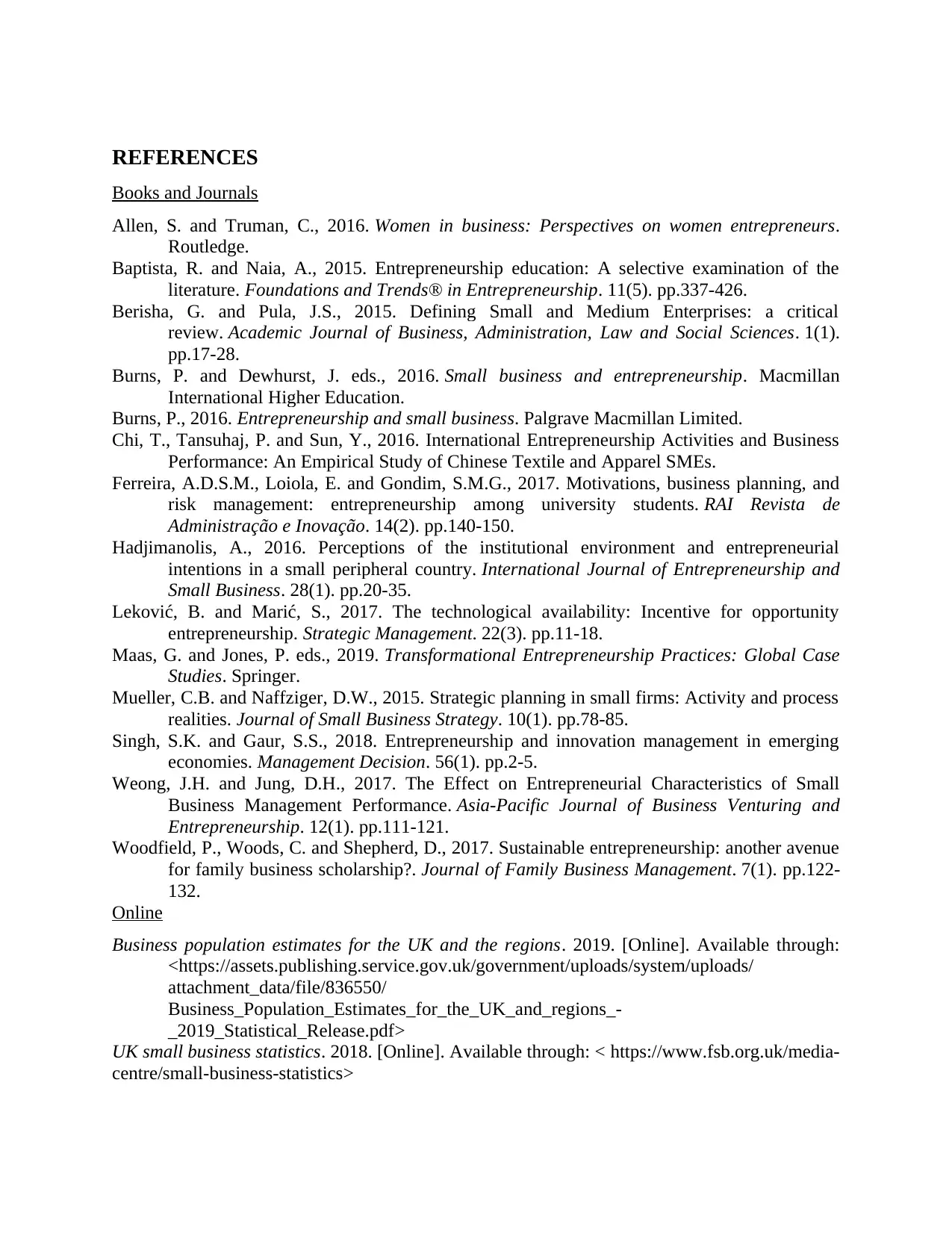
REFERENCES
Books and Journals
Allen, S. and Truman, C., 2016. Women in business: Perspectives on women entrepreneurs.
Routledge.
Baptista, R. and Naia, A., 2015. Entrepreneurship education: A selective examination of the
literature. Foundations and Trends® in Entrepreneurship. 11(5). pp.337-426.
Berisha, G. and Pula, J.S., 2015. Defining Small and Medium Enterprises: a critical
review. Academic Journal of Business, Administration, Law and Social Sciences. 1(1).
pp.17-28.
Burns, P. and Dewhurst, J. eds., 2016. Small business and entrepreneurship. Macmillan
International Higher Education.
Burns, P., 2016. Entrepreneurship and small business. Palgrave Macmillan Limited.
Chi, T., Tansuhaj, P. and Sun, Y., 2016. International Entrepreneurship Activities and Business
Performance: An Empirical Study of Chinese Textile and Apparel SMEs.
Ferreira, A.D.S.M., Loiola, E. and Gondim, S.M.G., 2017. Motivations, business planning, and
risk management: entrepreneurship among university students. RAI Revista de
Administração e Inovação. 14(2). pp.140-150.
Hadjimanolis, A., 2016. Perceptions of the institutional environment and entrepreneurial
intentions in a small peripheral country. International Journal of Entrepreneurship and
Small Business. 28(1). pp.20-35.
Leković, B. and Marić, S., 2017. The technological availability: Incentive for opportunity
entrepreneurship. Strategic Management. 22(3). pp.11-18.
Maas, G. and Jones, P. eds., 2019. Transformational Entrepreneurship Practices: Global Case
Studies. Springer.
Mueller, C.B. and Naffziger, D.W., 2015. Strategic planning in small firms: Activity and process
realities. Journal of Small Business Strategy. 10(1). pp.78-85.
Singh, S.K. and Gaur, S.S., 2018. Entrepreneurship and innovation management in emerging
economies. Management Decision. 56(1). pp.2-5.
Weong, J.H. and Jung, D.H., 2017. The Effect on Entrepreneurial Characteristics of Small
Business Management Performance. Asia-Pacific Journal of Business Venturing and
Entrepreneurship. 12(1). pp.111-121.
Woodfield, P., Woods, C. and Shepherd, D., 2017. Sustainable entrepreneurship: another avenue
for family business scholarship?. Journal of Family Business Management. 7(1). pp.122-
132.
Online
Business population estimates for the UK and the regions. 2019. [Online]. Available through:
<https://assets.publishing.service.gov.uk/government/uploads/system/uploads/
attachment_data/file/836550/
Business_Population_Estimates_for_the_UK_and_regions_-
_2019_Statistical_Release.pdf>
UK small business statistics. 2018. [Online]. Available through: < https://www.fsb.org.uk/media-
centre/small-business-statistics>
Books and Journals
Allen, S. and Truman, C., 2016. Women in business: Perspectives on women entrepreneurs.
Routledge.
Baptista, R. and Naia, A., 2015. Entrepreneurship education: A selective examination of the
literature. Foundations and Trends® in Entrepreneurship. 11(5). pp.337-426.
Berisha, G. and Pula, J.S., 2015. Defining Small and Medium Enterprises: a critical
review. Academic Journal of Business, Administration, Law and Social Sciences. 1(1).
pp.17-28.
Burns, P. and Dewhurst, J. eds., 2016. Small business and entrepreneurship. Macmillan
International Higher Education.
Burns, P., 2016. Entrepreneurship and small business. Palgrave Macmillan Limited.
Chi, T., Tansuhaj, P. and Sun, Y., 2016. International Entrepreneurship Activities and Business
Performance: An Empirical Study of Chinese Textile and Apparel SMEs.
Ferreira, A.D.S.M., Loiola, E. and Gondim, S.M.G., 2017. Motivations, business planning, and
risk management: entrepreneurship among university students. RAI Revista de
Administração e Inovação. 14(2). pp.140-150.
Hadjimanolis, A., 2016. Perceptions of the institutional environment and entrepreneurial
intentions in a small peripheral country. International Journal of Entrepreneurship and
Small Business. 28(1). pp.20-35.
Leković, B. and Marić, S., 2017. The technological availability: Incentive for opportunity
entrepreneurship. Strategic Management. 22(3). pp.11-18.
Maas, G. and Jones, P. eds., 2019. Transformational Entrepreneurship Practices: Global Case
Studies. Springer.
Mueller, C.B. and Naffziger, D.W., 2015. Strategic planning in small firms: Activity and process
realities. Journal of Small Business Strategy. 10(1). pp.78-85.
Singh, S.K. and Gaur, S.S., 2018. Entrepreneurship and innovation management in emerging
economies. Management Decision. 56(1). pp.2-5.
Weong, J.H. and Jung, D.H., 2017. The Effect on Entrepreneurial Characteristics of Small
Business Management Performance. Asia-Pacific Journal of Business Venturing and
Entrepreneurship. 12(1). pp.111-121.
Woodfield, P., Woods, C. and Shepherd, D., 2017. Sustainable entrepreneurship: another avenue
for family business scholarship?. Journal of Family Business Management. 7(1). pp.122-
132.
Online
Business population estimates for the UK and the regions. 2019. [Online]. Available through:
<https://assets.publishing.service.gov.uk/government/uploads/system/uploads/
attachment_data/file/836550/
Business_Population_Estimates_for_the_UK_and_regions_-
_2019_Statistical_Release.pdf>
UK small business statistics. 2018. [Online]. Available through: < https://www.fsb.org.uk/media-
centre/small-business-statistics>
1 out of 13
Related Documents
Your All-in-One AI-Powered Toolkit for Academic Success.
+13062052269
info@desklib.com
Available 24*7 on WhatsApp / Email
![[object Object]](/_next/static/media/star-bottom.7253800d.svg)
Unlock your academic potential
© 2024 | Zucol Services PVT LTD | All rights reserved.





